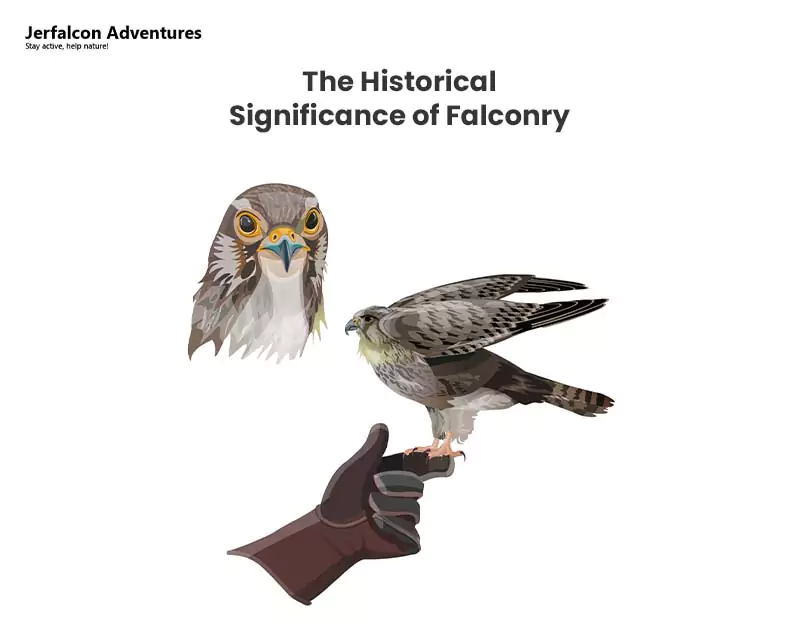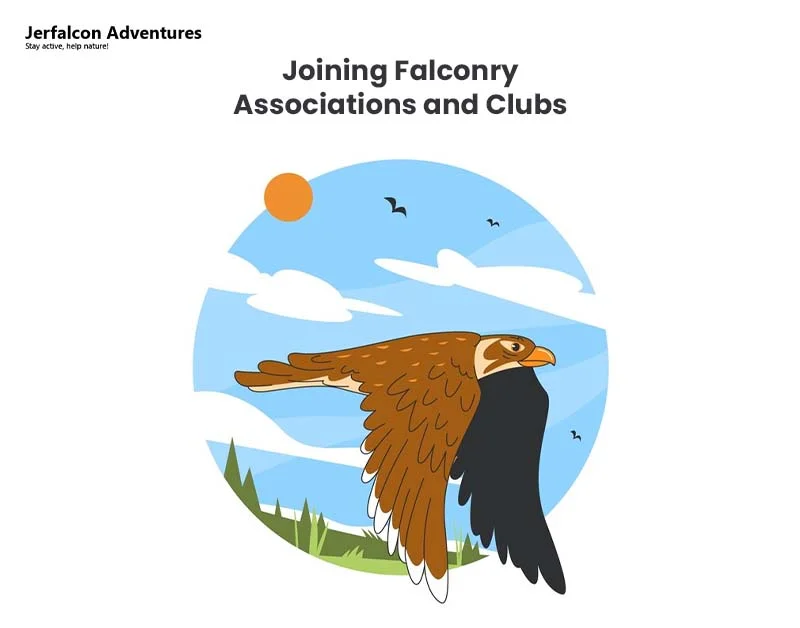Step-by-Step Guide to Become a Falconer is not just any manual; it’s your passport to a world where the sky isn’t the limit! Have you ever dreamed of mastering the art of falconry with the majestic Gyrfalcon soaring above? Whether you’re enticed by the rich history of falconry or captivated by the unique traits of falconry birds, this guide promises a comprehensive journey.
Dive deep into specialized hawk training methods and elevate your falconry experience to heights previously unimagined. With detailed falconry training techniques at your fingertips, you’re not just learning to become a falconer – you’re preparing to become a legend. Join us, and let the adventure unfold!
Understanding Falconry
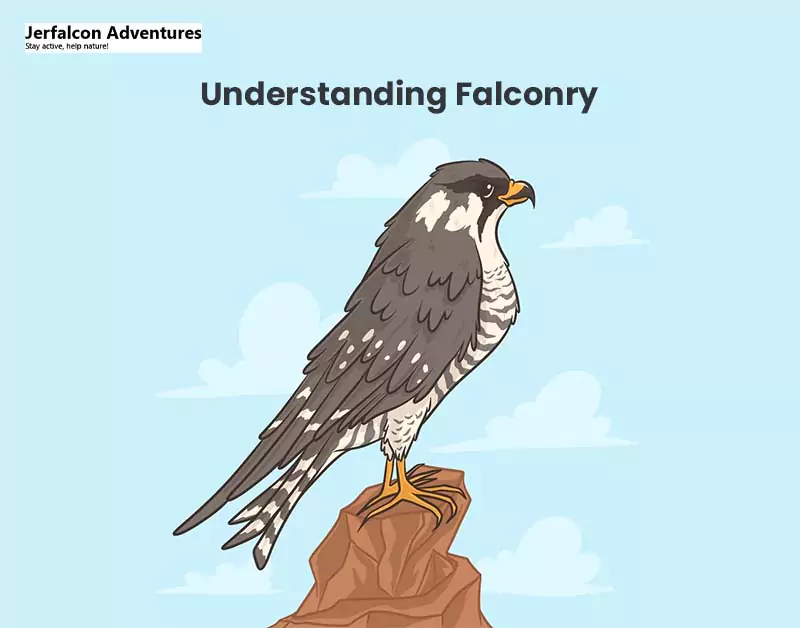
Falconry, an ancient art that dates back millennia, involves training birds of prey to hunt in partnership with humans. Aspiring falconers embarking on this intricate journey often start with falconry training courses. These courses offer a blend of theoretical knowledge and hands-on experience, crucial for nurturing a strong bond between the falconer and the bird. Additionally, falconry books are valuable resources, providing historical insights, techniques, and stories from seasoned experts.
But knowledge alone isn’t enough. The right equipment for falconry, from gloves to perches and hoods, is paramount for safe and practical training. Individuals can unlock a deep connection between man and bird with the proper falconer training. This training combines various elements for a profound experience. It goes beyond mere hunting. Instead, it delves into a practice deeply rooted in cultural and natural heritage.
Falconry, often called the “sport of kings,” holds a storied historical position. Over centuries, the practice has been more than just training birds. It has been a testament to the deep bond between humans and birds of prey. Ancient cultures treasured their falconry experiences, as these were seen not just as hunting expeditions but as spiritual and societal engagements.
Many royal figures and nobles were patrons of falconry schools, using them not only to learn the skills of a bird handler but also to understand the nuances of leadership and patience. In medieval Europe, for instance, the type of hunting falcon one owned symbolized one’s rank. A master falconer wasn’t just an expert in the field; they were revered figures, possessing knowledge passed down through generations.
In many societies, owning a falcon was not merely about hunting. It was a status symbol, a representation of power, and a connection to the natural world. The historical significance of falconry thus paints a picture of a practice intertwined with culture, status, and the reverence of nature’s magnificent raptors.
Legal and Ethical Considerations

To safeguard the welfare of the birds and the integrity of the art, participants in falconry must follow strict regulatory standards. Aside from ownership, tight laws govern the travel, breeding, and release of birds of prey. Ethical considerations also come into play, as falconers must prioritize the birds’ well-being by ensuring they live in adequate conditions and are trained humanely.
Falconry Regulations and Permits
Many countries regulate falconry and require individuals who wish to participate in becoming a falconer to obtain permission. A permit frequently requires training, passing tests, and providing adequate bird conditions. Furthermore, separate licenses are available for apprentices, regular falconers, and master falconers, each with its own set of responsibilities and privileges. Regular inspections and strict adherence to these requirements ensure that falconry traditions are responsibly preserved.
Ethical Treatment of Birds of Prey
The ethics of falconry extend beyond the legal. Because of their untamed character, birds of prey should be treated with respect and understanding. It is critical to ensure their physical and emotional well-being. This involves giving large, clean stalls, a varied feed, and the ability to exhibit natural behavior. Training must be built on trust, and punishment or abuse is prohibited. True falconers understand that treating birds ethically increases the link between them and leads to a more pleasant falconry experience.
Initial Research and Self-Assessment
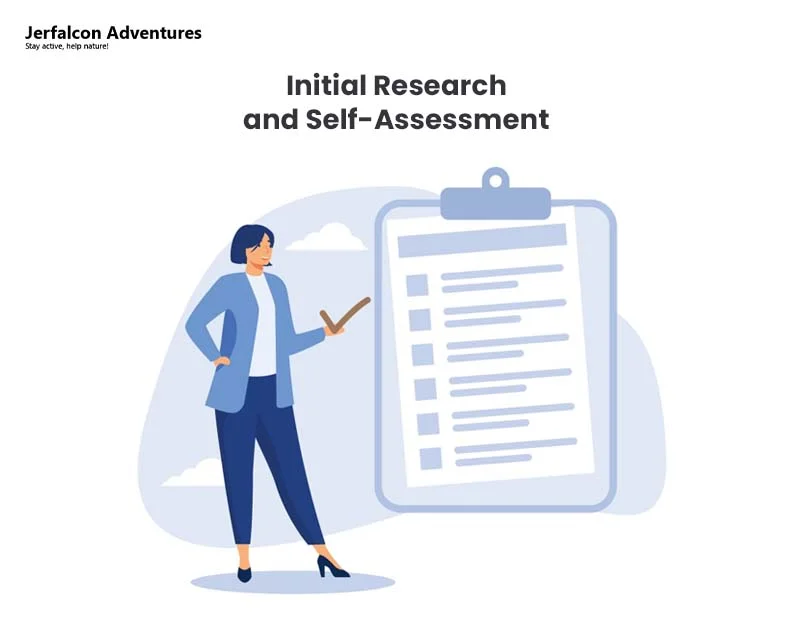
Thorough research is required before venturing into the field of falconry. Falconry is more than a hobby; it is a devotion to a live entity with specific requirements. The importance of self-evaluation must be balanced. Aspiring falconers must examine their motivations, availability, and willingness to adapt to the bird’s needs. Understanding your objectives and limitations is the first step toward a rewarding falconry career.
The Commitment Involved in Falconry
Falconry necessitates unwavering dedication. It’s not just about having a bird; it’s about developing a friendship based on mutual respect and trust. That involves making daily time for exercise, diet, and care, regardless of the weather or personal schedules. Falconry is a serious hobby; these birds can live for many years and require continual care. It is a dynamic partnership that requires falconers to evolve and adapt with their birding partners.
Ensuring the Right Temperament for Falconry
The falconry world is not for the faint of heart. It takes a patient, determined attitude and an innate love for these gorgeous creatures. Frustrated or impatient behaviors might have an impact on the falconer-bird bond. It is critical to approach obstacles with patience, empathy, and a willingness to learn. Each bird is distinct, and matching the temperament to the bird’s personality creates a peaceful partnership.
Physical and Financial Requirements
Falconry is a physically and financially demanding profession. Falconers must be physically fit to travel to different terrain and track their birds during hunting. There are certain upfront costs, such as purchasing the necessary equipment and housing the bird. Food, medical care, and license renewal are ongoing expenses. Before beginning falconry, examining your ability to meet these prerequisites is critical.
Joining Falconry Associations and Clubs
Participating in falconry groups and clubs may be life-changing for novice and experienced falconers. These organizations offer structured learning environments, mentorship possibilities, and a community of people who have similar interests. One of the platforms you may like to join is Jerfalcon Adventures. We provide a forum for falconers to share their experiences, learn from experienced falconers, and participate in cooperative activities that enrich falconry. You may also like to know tips for successful falconry training.
Benefits of Joining Falconry Organizations
In addition to friendship, falconry schools provide other advantages. They provide formal training as well as workshops and lectures. Members have access to resources, equipment savings, and specialist veterinary services. These groups frequently campaign for falconers’ rights and the preservation and advancement of this ancient skill. Being a part of such a group also brings affirmation, encouragement, and the shared satisfaction of success.
Networking and Learning Opportunities
Organizations providing falconry training serve as sites for networking and education. They arrange events, field meetings, and conferences regularly so that members can network and share information. Networking opens the door to mentor-mentee relationships, collaborative projects, and possible collaborations.
Continuous learning, whether through seminars, field observations, or informal discussions, ensures that falconers are current on the newest techniques, research, and ethical issues, enriching their personal and communal falconry experiences.
Finding a Mentor
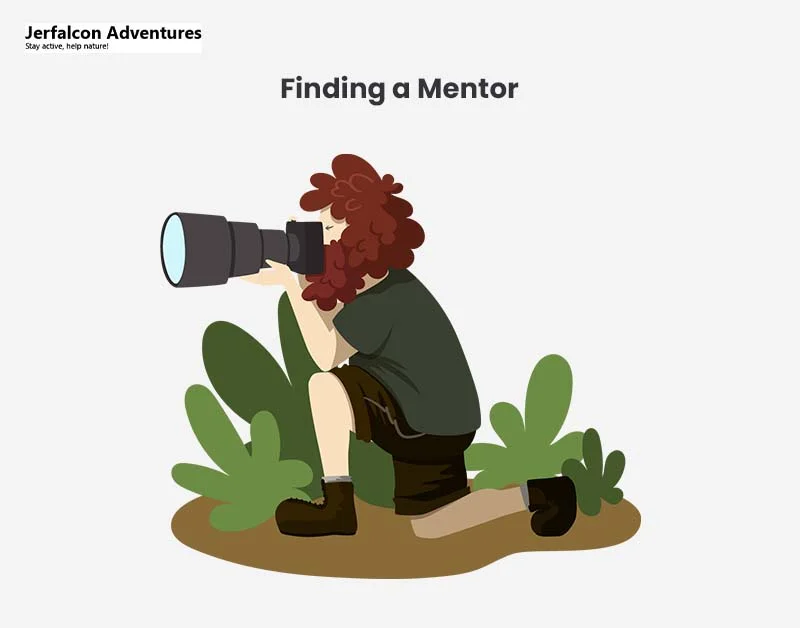
Embarking on your falconry journey with Jerfalcon Adventures ensures you’re guided every step of the way. Our comprehensive falconry training courses are designed to provide both theoretical knowledge and hands-on experience.
As you delve into falconry with us, we match you with an experienced mentor tailored to your learning style and aspirations. This one-on-one guidance enhances your understanding and helps cultivate a strong bond between you and your bird. At Jerfalcon Adventures, the right mentorship is the cornerstone of a fulfilling falconry journey. Let us guide you, ensuring your path is both enriching and informed.
Understanding Birds of Prey
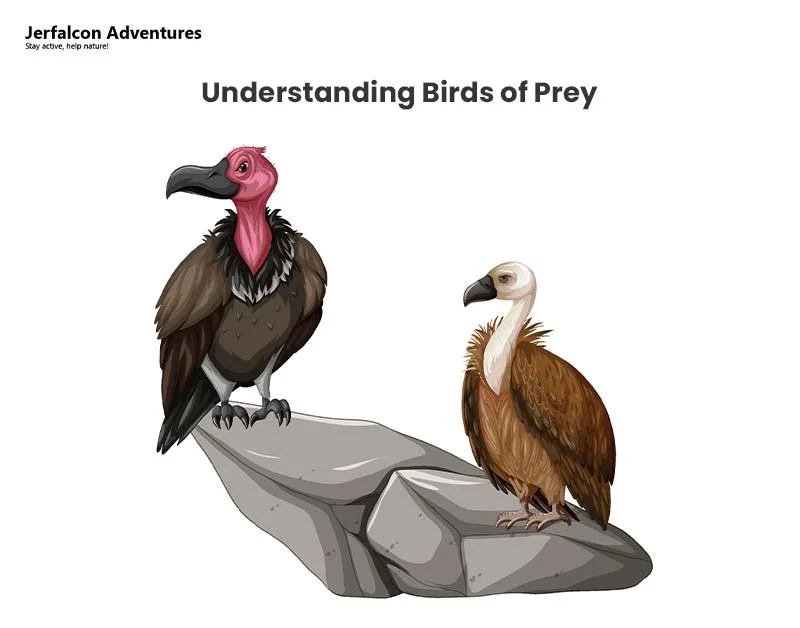
Birds of prey, also known as raptors, are a unique avian species distinguished by their hunting prowess. These birds are top predators in their habitats, with excellent vision, powerful claws, and beaks specialized to grip and eat prey. Their evolutionary characteristics make them master hunters who have piqued the interest of humans for thousands of years.
Falconry Bird Species
Certain bird species have always been preferred in falconry due to their training and hunting qualities. Falcons, hawks, eagles, and owls are among them. Each group is unique in size, hunting techniques, and habitat preferences, making them perfect for various falconry experiences. Their majestic appearance and adaptable temperament have elevated them to the forefront of the falconry world.
Falconry Bird Characteristics and Behavior
Certain qualities distinguish the birds employed in falconry. Their keen vision, which may be up to eight times that of a human, helps them to locate prey from long distances. They have powerful flight ability, with some falcons swooping at speeds up to 400 km/h. Although they are wild animals, many species can associate with humans behaviorally if adequately trained and demonstrate loyalty and independence in their acts.
Selecting the Right Bird for You
When choosing your avian partner, it’s essential to consider your environment, the time you can dedicate, and your falconry aspirations. At Jerfalcon Adventures, falconry is a profoundly personal journey, and the choice of bird plays a pivotal role in this experience. Our team is here to guide you, providing insights into various species’ behavior, needs, and characteristics.
Getting Started with Falconry Training
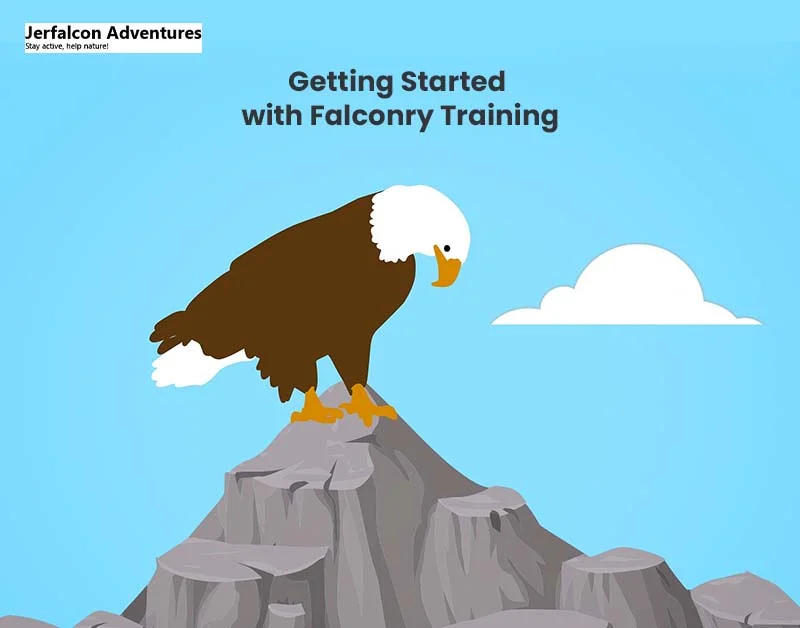
Falconry is a captivating art that intertwines humans and birds in a bond of trust and mutual respect. To embark on this journey, beginning with structured training is crucial. This introduces novices to the world of raptors, their behaviors, needs, and falconry training techniques. Equipping oneself with foundational knowledge through courses, workshops, and hands-on experiences lays the groundwork for a fulfilling falconry adventure.
Taking the Test
Before you can formally enter the realm of falconry, you must generally complete a rigorous test. This exam measures your understanding of bird husbandry, training methods, and legal regulations. This is vital in ensuring that future falconers have the knowledge and responsibilities to embark on this challenging adventure.
Finding a Sponsor
Finding an experienced sponsor is critical if you have decided to begin falconry. A sponsor serves as a mentor, gives orientation, exchanges experiences, and offers vital insight into the complexities of the field. Their duty extends beyond basic falconry training; they assist in transforming you into a responsible and compassionate falconer, as well as preserving and respecting the centuries-old falconry traditions.
Falconry Equipment and Facilities
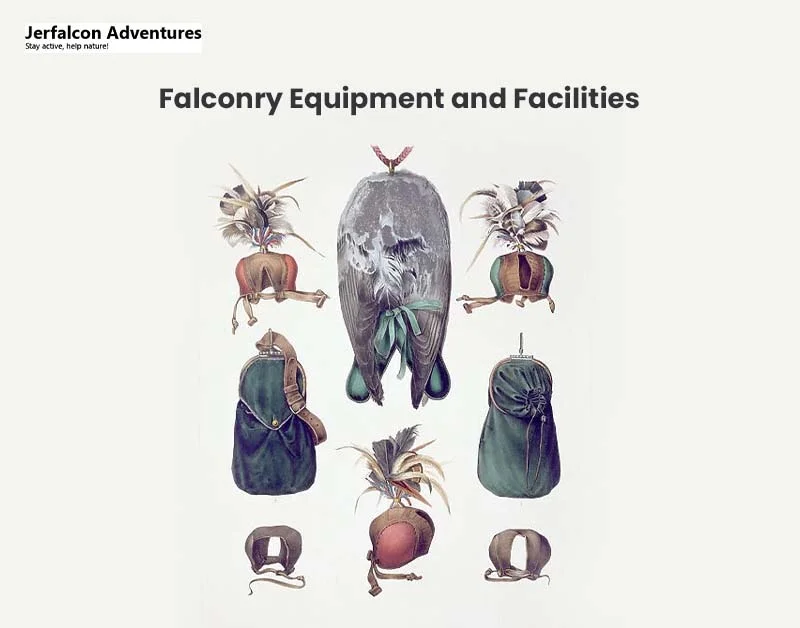
Diving into the falconry world requires more than passion; it demands the proper facilities and tools. The equipment for falconry is designed to ensure both the safety of the bird and the falconer. From specialized housing structures to protective gear, every piece plays a pivotal role in making the falconry experience seamless and fulfilling.
Essential Falconry Equipment
A falconer’s toolkit is an amalgamation of tradition and function. To ensure practical falconer training and bird handling, specific equipment is indispensable. This includes protective gloves, jesses for control, and appropriate housing for the bird’s well-being.
Falconry Glove
The falconry glove is not just a piece of equipment but a symbol of the bond between bird and handler. Crafted to protect the falconer’s hand from sharp nails, it’s an essential tool during falconer training and everyday interactions, ensuring the safe handling of these majestic raptors.
Jesses and Leashes
Jesses and leashes are integral to safely managing and controlling birds of prey. These leather straps, attached to the bird’s legs, allow falconers to maintain a gentle hold, ensuring the bird’s safety and comfort during training sessions and outings.
Mews (Housing for Birds)
A mews, designed explicitly for raptors, is paramount for their well-being. This facility ensures the bird has ample space, protection from the elements, and a secure environment. Proper mews construction is a testament to a falconer’s commitment to the bird’s health and safety.
Building or Acquiring a Mews
The stable, a particular habitat for raptors, is critical to their health. If you undertake falconry, you can either build or buy a hut. Building from the ground up allows for personalization, ensuring that the facility suits the exact demands of your bird. Purchasing a prefabricated coop, on the other hand, might save time because it meets the bird’s standards and needs. Regardless of the route, the stable must give adequate room, safety, and weather protection.
Equipment Care and Maintenance
Regular care and repair are essential for the longevity and efficacy of falconry equipment. Gloves, jackets, and belts made of leather require special care to keep supple. Hoods, seat posts, and telemetry equipment should be examined for wear regularly. Falconers safeguard the safety and comfort of their birds and themselves by maintaining their equipment in good shape.
Sending in Your Completed Paperwork

Starting a falconry business necessitates paperwork to guarantee that all legal criteria are satisfied. After completing the training and inspecting the facilities, the relevant forms must be filled out. It is essential to double-check the information provided, attach the relevant documents, and send the paperwork to the responsible authorities for smooth processing.
Waiting for Your License

There will be a waiting period for your falconry permit after you submit your application. Authorities can assess the application during this time to ensure that all requirements are completed. Patience is essential at this point. It’s an excellent opportunity to broaden your knowledge, network with other falconers, and prepare for your bird’s arrival.
Trapping Your Bird
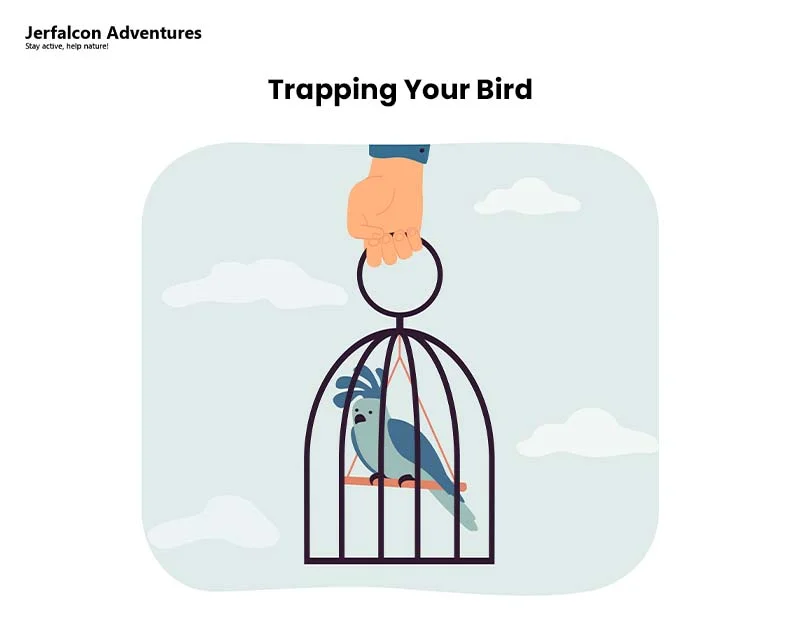
After you’ve obtained your license, the following step is to purchase your bird. Taking a wild bird is the favored option for many falconers. This method needs talent, patience, and obedience to legal constraints about what species and when they can be caught. Bait and skillfully crafted traps protect the bird’s safety during capture.
Training Your Bird
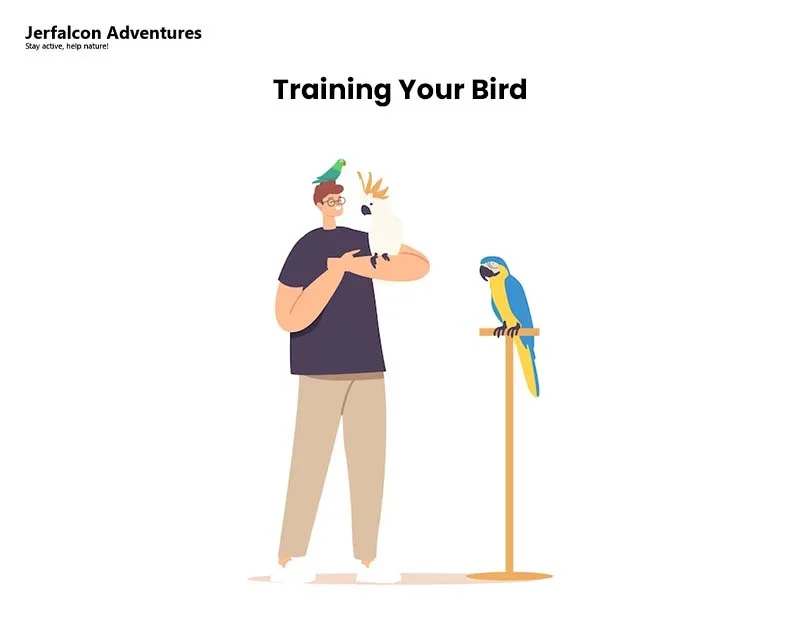
The link between falconer and bird is formed throughout training. The falconer teaches the bird to answer calls, carry equipment, and hunt together using gentle, consistent approaches. The delicate balance between reinforcing natural behavior and fostering trust necessitates patience and a thorough grasp of the bird’s signals.
Hunting with Your Falcon
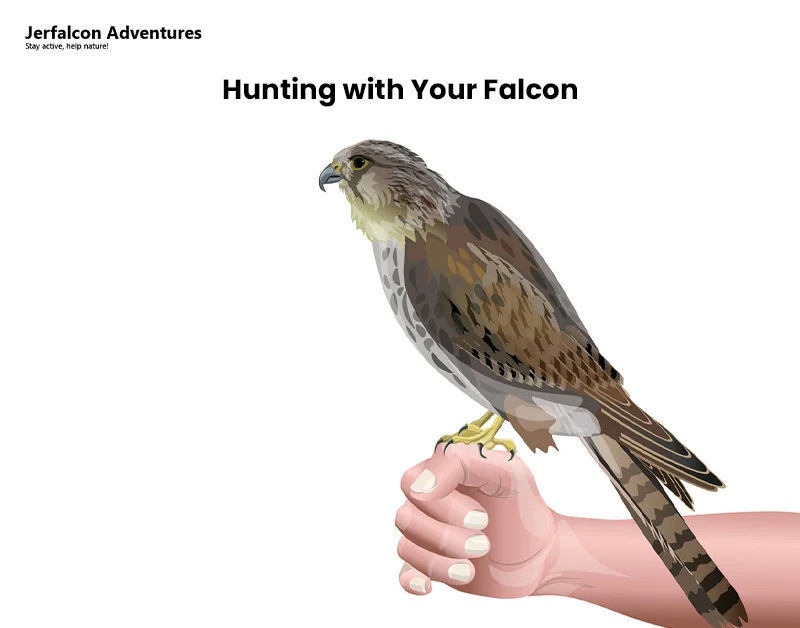
Hunting with your trained bird of prey is the highlight of falconry. It’s not only about hunting; it’s about witnessing the bird’s natural ability in action. It is a time of pride and awe for the falconer as he watches his feathered partner negotiate the skies, symbolizing the ancient and delicate dance of predator and prey.
Conclusion
A dance has been choreographed for thousands of years in the broad sky, a synergy between humans and birds of prey that constitutes falconry. We hope that while you read this guide, you sensed the rhythm of history, the passion of the falconer, and the allure of wild birds of prey. Falconry is more than a hobby; it is a legacy, a testament to a bond that crosses borders.
Whether you wish to begin or advance your falconry journey, remember that every falconer began as a beginner, driven by passion and the desire to soar. May the horizon beckon and the falcon call you with zeal, and may your falconry adventure be as endless as the sky! You might like “The Art of Falconry” by Patrick Morel and “Falconry & Hawking” by Phillip Glasier.
